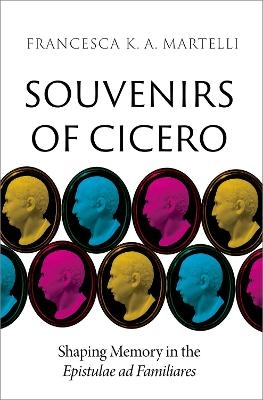
Souvenirs of Cicero
Shaping Memory in the Epistulae ad Familiares
Seiten
2025
Oxford University Press Inc (Verlag)
978-0-19-776196-0 (ISBN)
Oxford University Press Inc (Verlag)
978-0-19-776196-0 (ISBN)
- Lieferbar (Termin unbekannt)
- Versandkostenfrei innerhalb Deutschlands
- Auch auf Rechnung
- Verfügbarkeit in der Filiale vor Ort prüfen
- Artikel merken
Souvenirs of Cicero studies the narratives that the letter collections of Cicero unfold and looks closely at the ancient format of Epistulae ad Familiares, the collection that incorporates Cicero's widest cast of correspondents and has been most vulnerable to later editorial reorganization. It attends to this collection's status as an artefact of the Roman imperial period.
Cicero's letters have figured prominently in some of western modernity's most cherished illusions about the immediacy of its encounter with Classical antiquity. Celebrated since their discovery in the Renaissance for their intimate mode of self-expression, they have been prized since then for the unparalleled proximity they appear to lend to the events and leading figures of the late Republic. However, the letters were only organized into books and collections and published assuch by editors after Cicero's death, and are therefore also the products of a later era.
Souvenirs of Cicerois a study of the narratives that the letter collections plot, and of the belated, post-Republican perspectives that shape them. It focuses on theEpistulae ad Familiares, the collection that incorporates Cicero's widest cast of correspondents, and which has been most vulnerable to the modern editorial impulse to reorganize the letter collections along chronological lines. This book attempts to reverse that impulse by appraising the collection in the format transmitted from antiquity and attending to its status as an artefact of the later imperial age.
Francesca K. A. Martelli traces the social, political and technological agencies that shaped this letter collection in antiquity, and elucidates the interests that these editorial interventions serve both for ancient readers and for our interpretation of the letters today. Integrating close readings of the letters with hypotheses drawn from contemporary media theory, she makes the case for considering Cicero's letters as residual media, which haunt subsequent history with the Republic's lost futures as they circulate beyond their own era.
Cicero's letters have figured prominently in some of western modernity's most cherished illusions about the immediacy of its encounter with Classical antiquity. Celebrated since their discovery in the Renaissance for their intimate mode of self-expression, they have been prized since then for the unparalleled proximity they appear to lend to the events and leading figures of the late Republic. However, the letters were only organized into books and collections and published assuch by editors after Cicero's death, and are therefore also the products of a later era.
Souvenirs of Cicerois a study of the narratives that the letter collections plot, and of the belated, post-Republican perspectives that shape them. It focuses on theEpistulae ad Familiares, the collection that incorporates Cicero's widest cast of correspondents, and which has been most vulnerable to the modern editorial impulse to reorganize the letter collections along chronological lines. This book attempts to reverse that impulse by appraising the collection in the format transmitted from antiquity and attending to its status as an artefact of the later imperial age.
Francesca K. A. Martelli traces the social, political and technological agencies that shaped this letter collection in antiquity, and elucidates the interests that these editorial interventions serve both for ancient readers and for our interpretation of the letters today. Integrating close readings of the letters with hypotheses drawn from contemporary media theory, she makes the case for considering Cicero's letters as residual media, which haunt subsequent history with the Republic's lost futures as they circulate beyond their own era.
Francesca K. A. Martelli is Professor of Classics at the University of California, Los Angeles, the author of Ovid's Revisions, and, with Giulia Sissa, co-editor of Ovid's Metamorphoses and the Environmental Imagination.
Introduction: Receiving Cicero's Letters: A Brief History
1. Letters to the Editor: Constructing the Editor in Fam. 16
2. Enclosing the Collection: Frames of Meaning in Fam. 1 and Fam. 15
3. Reorienting the Collection: Cicero as Addressee and the Arena of Letters
in Fam. 8
4. Ordering the Collection: History and Counter-history in Fam. 10-12
5. Structures of Feeling: The Household of Familiaritas in Fam. 13
Epilogue
Appendix
Bibliography
| Erscheinungsdatum | 05.07.2024 |
|---|---|
| Verlagsort | New York |
| Sprache | englisch |
| Maße | 152 x 226 mm |
| Gewicht | 522 g |
| Themenwelt | Literatur ► Klassiker / Moderne Klassiker |
| Geschichte ► Allgemeine Geschichte ► Vor- und Frühgeschichte | |
| Geisteswissenschaften ► Geschichte ► Regional- / Ländergeschichte | |
| Geisteswissenschaften ► Sprach- / Literaturwissenschaft ► Anglistik / Amerikanistik | |
| Geisteswissenschaften ► Sprach- / Literaturwissenschaft ► Literaturwissenschaft | |
| ISBN-10 | 0-19-776196-8 / 0197761968 |
| ISBN-13 | 978-0-19-776196-0 / 9780197761960 |
| Zustand | Neuware |
| Informationen gemäß Produktsicherheitsverordnung (GPSR) | |
| Haben Sie eine Frage zum Produkt? |
Mehr entdecken
aus dem Bereich
aus dem Bereich
Was Pompeji über uns erzählt
Buch | Hardcover (2023)
Propyläen (Verlag)
32,00 €
auf den Spuren der frühen Zivilisationen
Buch | Hardcover (2023)
C.H.Beck (Verlag)
20,00 €


